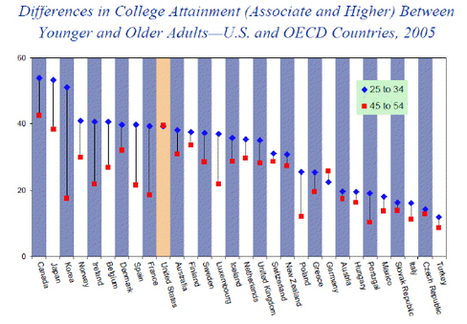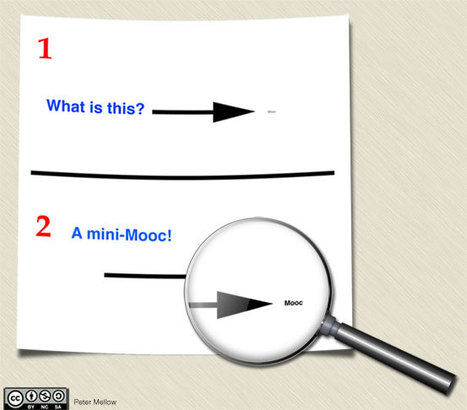 Your new post is loading...
 Your new post is loading...

|
Scooped by
Peter Mellow
August 10, 2012 10:08 AM
|
The tectonic shift due to MOOCs has disrupted Higher Education and Universities. How would new models of higher education (HE) be based on? Ever thought about fantasy in education, where higher education is offered free to anyone around the world? MOOC: how-coursera-free-online-education-service-will-school-us-all tells the story.

|
Scooped by
Peter Mellow
August 9, 2012 10:37 AM
|
Nevertheless, questions are being raised whether there is anything different with the ideas of MOOCs that has not been already there through distance learning initiatives that many universities have held for decades. While the ideas of having open courses available online is not new, the scale of the students entering MOOCs definitely seems to set them apart from earlier initiatives and the development of technology provides a massive increase in accessibility. Udacity now has over 112 000 students and MITx first course attracted over 150 000 students. However, one of the big issues for MOOCs this far is that while they can boast with enormous enrolments rates, the actual graduation rates are extremely low. For instance, of the 150 000 that signed up for the MITx course, only just above 7000 actually completed the course, indicating a graduation rate of ca 5%.

|
Scooped by
Peter Mellow
August 8, 2012 10:00 PM
|
This article takes a careful and detailed look at different ways that students might convert MOOCs into formal university or college credits, using prior-learning assessment, e-portfolios or competency-based approaches. In the examples given, it’s possible but not easy or cheap. In other cases, it isn’t even possible.

|
Scooped by
Peter Mellow
August 8, 2012 8:04 PM
|
The online higher education world underwent a massive shift last week with the announcement that a dozen major research universities have teamed up with Coursera, a new company that partners with universities to provide free massive open online courses (MOOCs) to an unlimited number of students. What remains to be seen is the effect this high-level participation will have on higher education itself—including whether students enrolled in online courses will eventually receive accreditation that satisfies the needs of employers and their own educational needs without driving up the costs of MOOCs to the point where they, too, become financially out of reach.

|
Scooped by
Peter Mellow
August 8, 2012 8:02 PM
|
MOOCs have become the headlines for many newspapers and perhaps the hot topics in 2012 to-date. This online learning revolution provides the background of this debate. ”MOOCs – a rapidly growing phenomenon launched around a year ago in the US, whereby prestigious universities such as Harvard make selected courses available over the internet to absolutely anybody around the world for free.”

|
Scooped by
Peter Mellow
August 8, 2012 8:01 PM
|
The big thing these days in education are free online courses, usually in the form of a number of videos that you watch online. The acronym coined is MOOC, or Massive Open Online Course and the mos...

|
Scooped by
Kim Flintoff
August 8, 2012 7:23 AM
|
Some double-click degrees may go as far as to unpack the course performance into discrete skills or competencies. With MOOCs continuing to make headlines, “badges” has become a fashionable construct. Like the boy and girl scouts they once were, educated adults won’t flaunt their degrees as much as a collection of badges testifying to skills or competencies that they have demonstrated. The key question is: by whom? Who will vouch that this student demonstrated this skill?
Graham Attwell, one of the founding fathers of personal learning environments, trying to make sense of xMOOCs and cMOOCs. (Peter Sloep)
Via Peter B. Sloep

|
Scooped by
Peter Mellow
August 7, 2012 7:39 AM
|
MOOCs are not for everyone. If a learner wants scaffolded learning – then a MOOC is probably not for them. Despite the hype, I don’t believe that MOOCs are going to replace traditional forms of learning – but I do think they are very important for experimenting with alternative ways of thinking about learning in the 21st century and that they offer the potential of bringing education and learning to people who might otherwise have no access to it.

|
Scooped by
Peter Mellow
August 7, 2012 7:33 AM
|
New article about MOOCs (the “massively open online courses” that have become all the rage this spring and summer — of which I am myself teaching one): link. “Some educators say these cyber courses can’t replace the academic community and learning experience of a traditional campus education.” Well, they're not supposed to. “If students can get high-quality academic material for free, colleges and universities will be pressed to demonstrate the education value they offer beyond lectures and exams.”

|
Scooped by
Peter Mellow
August 6, 2012 5:55 AM
|
When things arn't so massive anymore. I just wanted to lighten up the MOOC mood.

|
Scooped by
Kim Flintoff
August 6, 2012 12:27 AM
|
Bonk, Preconference COP at Madison DL Conference, August 8, 2012, OER and MOOCS. KF: An advance release of Curtis Bonk's slides from his Community of Practice focussing on MOOC and OER.

|
Scooped by
Peter Mellow
August 5, 2012 9:49 PM
|
Jenny says in her post how-does-a-mooc-demonstrate-its-value? MOOCs are not for everyone. If a learner wants scaffolded learning – then a MOOC is probably not for them. Despite the hype, I don’t believe that MOOCs are going to replace traditional forms of learning.
|

|
Scooped by
Peter Mellow
August 9, 2012 10:38 AM
|
Call it Nature’s sense of humor, but evolution has a habit of creating some very odd, yet revolutionary offshoots in its grand competition of, “let the best man win.” While it’s too early in the game to know whether MOOCs are the evolutionary equivalent of modern day humans or Neanderthals, my hunch is that it’s the latter, as the MOOC in its current form is encoded with a fatal economic flaw that makes it all but certain to fail.
David Kernohan on the growth of open online learning.
Via David Cummings

|
Rescooped by
Kim Flintoff
from Digital scholarship
August 8, 2012 8:17 PM
|
In the summer of 2012 the team of teachers and researchers associated with the MSc in E-learning programme at the University of Edinburgh began developing a Massive Open Online Course (MOOC) for the Coursera platform. Launched only a year earlier, this for-profit company founded by Stanford professors Andrew Ng and Daphne Koller has focussed primarily on hosting computer science related courses from big name US institutions. The recently announced partnership with the University of Edinburgh presented the team with an opportunity to engage and experiment with the much-publicised MOOC format, and foreground issues related to the theory and practice of online education itself. What follows are some of our perspectives on the planning and development of a large scale open course, what challenges the MOOC presents for delivering a worthwhile educational experience, and what questions this type of course format provokes for a team already teaching and researching in the field of e-learning and technology in higher education
Via Martin Weller

|
Scooped by
Peter Mellow
August 8, 2012 8:04 PM
|
Recently, Cornell professor Noliwe Rooks (@nrookie) posted a thoughtful warning in response to recent adulation for massive open online course (MOOC) websites like Coursera, edX, and Udacity. In Why the Online-Education Craze Will Leave Many Students Behind Rooks writes “…I am concerned that computer-aided instruction will actually widen the gap between the financially and educationally privileged and everyone else, instead of close it. This is what has been happening in K-12 public schools. Over the past 10 years, public school districts have invested millions of dollars in various types of online and computer-aided learning and instruction programs, yet few are able to show the educational benefit of their expenditures for a majority of students. Those who benefit most are already well organized and highly motivated. Other students struggle, and may even lose ground…”

|
Scooped by
Peter Mellow
August 8, 2012 8:01 PM
|
Design Studio MOOC (Massive Open Online Course) focusing on the theme of curriculum design with OERs (Open Electronic Resources), to be held in Autumn 2012. This course will be valuable for anyone seeking to develop their professional skills and experience in curriculum design, learning design and use of OERs in education. In particular the course will appeal to new and established HE and FE lecturers, to those completing professional certificates in teaching, and to researchers and managers of teaching and learning innovation." Register your interest at http://goo.gl/j5jIe
As top-ranked universities join the MOOC revolution, backed by big-name investors, Mike Boxall asks what we can learn from the first dot.com history and who the eventual winners will be...
Via Mark Smithers, Vasi Doncheva

|
Scooped by
Peter Mellow
August 7, 2012 11:06 PM
|
La Trobe University's first-semester iTunes-U offering, which takes in the history, literature, art and architecture of ancient Greece to the end of the 5th century BC, has attracted a staggering 45,500 subscribers and still counting.

|
Scooped by
Peter Mellow
August 7, 2012 7:40 AM
|
I’ve attempted 3 MOOCs with the best of intentions, I didn’t complete any of them. Yes, I teach teachers how to teach online and I should have been able to keep up with these, right? Nope- the content in all three was extremely rigorous, they all required full attention, and they required me to NOT fall behind. Once I did fall behind in each one, I gave up. I just couldn’t swing the extra time they required with the time I had to spend at work or on my other commitments. I failed to make them a priority, but that doesn’t mean I didn’t learn from them or that I don’t think they are a good option for others.

|
Scooped by
Peter Mellow
August 7, 2012 7:36 AM
|
I think Siemens is correct in assessing why MOOCs have all of a sudden become a big deal: money. He say’s in the last 8 months, there’s been around $100 million invested in MOOCs by venture capitalists. You put that much money into anything and there’s going to be at least a ripple. You put that much money into higher education, which runs on the cheap as it is and which has been all about slashing budgets every which way to stop the rising costs of tuition and fees, and you’ve got more than a ripple. Coursera’s founders stated goal of giving the world access to “the best” higher education is noble, but I guarantee that the investors who have put up the money have other goals.

|
Rescooped by
Peter Mellow
from Higher Ed Technology
August 7, 2012 7:32 AM
|
Nothing Will Stop the Incessant March Starting August 12, 2012, Hybrid Pedagogy, an online journal of teaching and technology, will host a MOOC (Massive Open Online Course) designed specifically at looking carefully at this new pedagogical approach.
Via Hybrid Pedagogy, Donna Murdoch

|
Scooped by
Peter Mellow
August 6, 2012 5:37 AM
|
Isn't it curious (or maybe just typical) that with all the mania around MOOC's (Massive Online Open Courseware), and all the "students today learn differently" talk, that there has been almost no conversation with students about (a) whether they would rather learn online or face to face or (b) how they learn best when they do learn online--lectures? interactives? quizzes? challenges? games? tutorials? augmented with social networks? augmented with actual study groups? New forms of assessment? If you do not include students in the conversation, you are merely replicating the hierarchical Sage-On-The-Stage model of pedagogy but on line. If students and learning are not intrinsically part of the MOOC conversation, then we're not talking education. We're talking $$$$$$$$$$$$$$$.

|
Scooped by
Peter Mellow
August 5, 2012 9:50 PM
|
This MOOC is a Connectivist environment. We see learning not just as phycological or neurological or even social processes. Learning is also change, generative thinking, new norms, creating artifacts, and making meaningful human connections. Learning is collective action.
|



 Your new post is loading...
Your new post is loading...




























